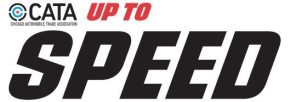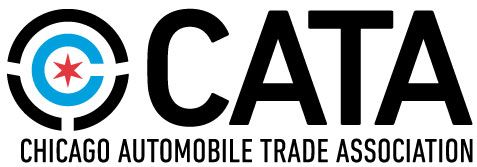
Dennis M. O’Keefe, P.C.
1025 W. Everett Rd.
Lake Forest, IL 60045
(847) 482-0400
dokeefe@dmokeefepc.com
Each CATA member is entitled to a limited amount of general legal advice from the association’s general counsel, Dennis O’Keefe. Dennis has extensive experience in the automotive industry, dealer line associations and manufacturer relations, as well as state and local government.
CATA Questions and Answers
The following is for informational purposes only and does not constitute a legal opinion. Should the need occur, members are encouraged to seek legal counsel.
QUESTION 1: What is required under the Illinois Predatory Loan Prevention Act (PLPA)?
The Illinois PLPA, which became effective Aug. 1, 2022, requires the dealer to provide a statutory notice to every customer who finances a vehicle explaining that a retailer shall not contract for or receive charges exceeding a 36% annual percentage rate on the unpaid balance of the amount financed for a retail installment contract, as calculated under the Illinois PLPA. The notice must also provide that any retail installment contract with a PLPA APR over 36% is null and void, and no person or entity shall have any right to collect, attempt to collect, receive or retain any principal, fee, interest or charges related to the retail installment contract. Further, the notice must also provide that the annual percentage rate disclosed in any retail installment contract may be lower than the PLPA APR.
It should be noted that all retail installment contracts or agreements must include this language as a “separate disclosure” signed by the consumer; the disclosure must be “clear and conspicuous (while clear and conspicuous is not defined in the PLPA, other regulatory acts require that a clear and conspicuous disclosure must be in at least 10 point type); the disclosure must be in English and in the same language as the retail installment contract; and the PLPA APR is based on the expansive definition of APR in the Military Lending Act (which includes all fees and charges, including charges and fees for single premium credit insurance and other ancillary products sold in connection with a credit transaction, which might otherwise be excludable from the APR).”
QUESTION 2: I understand that dealer cash is now taxable in Illinois. Can you explain?
You should note that dealer incentives paid to a dealer based upon the purchase of a vehicle from the supplier, and not conditioned on the retail sale of the vehicle, are not taxable. On the other hand, dealer incentives paid to the dealer and conditioned on the retail sale of a vehicle are taxable, except that:
- Dealer incentives contingent, at the time of sale, on making or having any additional retail sales (stair step incentives) are not taxable; and
- Dealer incentives or bonuses contingent on the dealer meeting certain manufacturer required marketing standards, facility standards or sales and service department satisfaction goals are not taxable (such as CSI store based or marketing-based incentives).
QUESTION 3: I sell a car to a customer who provides me with the address of his Lake Geneva, Wisconsin, home. Do I need to charge him Illinois sales tax?
The Illinois Revenue Code provides an exemption for Sales Taxes for purchases made by non-residents of Illinois. The fact that a customer has a domicile outside of Illinois does not mean that he is not an Illinois resident. However, since July 1, 2008, the Department of Revenue holds the dealer to the following requirements:
- The purchaser must sign the following certificate: “I (purchaser), under applicable penalties, including penalties for perjury and fraud, state that I am not an Illinois resident. I understand that if I am a resident of Illinois, or if I use the motor vehicle in Illinois for more than 30 days in a calendar year as provided in 86 Ill. Adm. Code 150.310(a) (7), then I am liable for tax, penalty and interest on this purchase.”
- The purchaser must also provide one of the following:
- A copy of the purchaser’s permanent non-Illinois Driver’s License; or
- If a copy of the non-Illinois Driver’s License is not kept or an Illinois license is present, a rebuttable presumption that the purchaser is an Illinois resident is created, which in turn requires the dealer to maintain other evidence of the non-residency of the purchaser, such as (i) Voters Registration Card with a non-Illinois address, or (ii) a copy of a purchase contract or lease agreement for a new non-Illinois residence, or (iii) a copy of a non-resident tax return, or (iv) credit report listing the purchaser’s primary residence in another state, or (v) property tax records claiming a homestead in another state, or (vi) other similar documentation.
If the documents above are kept, then, absent fraud, the Department will only proceed against the purchaser for any claim that the exemption did not apply. If the documentation above is not kept, the Department will disallow the exemption, subject to further review by the Department. In the case of a motor vehicle lease, the above provision shall apply to the lessee as if the lessee was the purchaser.
QUESTION 4: How does a vehicle qualify for interim use exemption from sales taxes?
Beginning July 1, 2008, the Illinois Department of Revenue set forth certain tests for automatic disqualification, safe harbor and situations not involving either of the above with respect to interim use exemption.
Certain activities automatically disqualify a vehicle from the interim use exemption. They are:
- Titling a vehicle in any person other than the retailer, manufacturer, the manufacturer’s captive finance company; or
- Retailer claims IRC Section 179 depreciation on the vehicle (i.e., treats the vehicle as a totally deductible business expense in the first year); or
- If the vehicle is leased, the gross receipts from the lease of the vehicle exceed the ultimate sales price of the vehicle.
If the dealer meets all six of the following requirements, the vehicle will automatically qualify for the interim use exemption:
- The vehicle must meet one of the following three requirements. It is:
- Listed in the dealer’s records as inventory; or
- Not depreciated by the dealer under IRC Section 167; or
- Otherwise indicated on dealer’s records, documents or operations as available for sale during the interim use period.
- The interim use period is less than 24 months.
- The vehicle is of the same general type sold by the dealer (i.e., a dealer of automobiles and light trucks that purchases another automobile or light truck, regardless of the brand, can do so and have it qualify for interim use, but cannot buy a trailer home or a large truck of a type not otherwise sold by the dealer and then claim interim use).
- The vehicle is ultimately sold by the dealer.
- For dealers who also lease or rent vehicles similar to the type of vehicle for which the interim use is claimed, then the dealer’s annual lease/rental revenue for all such vehicles must be less than the annual sales revenue for such vehicles.
- If the vehicle is leased under a lease agreement for more than 30 days, then the lease agreement must contain a provision that if a buyer is found for the vehicle, then either (i) the lease may be terminated within seven (7) days, or (ii) the lessee will receive a comparable vehicle substituted by the dealer for the vehicle within seven (7) days.
Finally, if the vehicle is not automatically disqualified, but does not qualify under the safe harbor, then the Department of Revenue will use all applicable and available facts to determine if interim use applies. These factors include, but are not limited to: the retail sales history of such type of vehicles; inventory records; advertising on the vehicle and at the location of the vehicle; manufacturer’s contract terms, conditions, discounts and rebates; length and location of use or lease prior to sale; whether depreciation is taken under IRC Section 167; ownership and control documents; and if leased, whether the lease contract provisions provide that the vehicle is subject to recall, substitution allowance, and sale during the lease period.
QUESTION 5: I spot-delivered a car to a customer, but I cannot obtain financing for him. What do I do if the customer refuses to return my vehicle or returns it with excess wear and tear or damage?
If a customer refuses to return the vehicle, the dealer may sue for replevin and/or damages. However, the dealer does not normally have the right to repossess the vehicle at this time. Repossession is an extraordinary remedy that may be exercised by a dealer only when he has a security interest in the vehicle and there is a default. Inasmuch as the security interest normally won’t arise until execution of the retail installment contract, repossession is not available to dealers in these instances. Oftentimes dealers use riders to the Retail Installment Contracts with language that provides that the buyer shall return the automobile and that the seller shall return to the buyer all deposits less the value of any damage done to the vehicle.
However, the Illinois Attorney General has issued an opinion that such language is in violation of Section 2C of the Illinois Consumer Fraud and Deceptive Business Practices Act which provides in relevant part: “If the furnishing of merchandise … is conditioned upon the consumers … having a credit rating acceptable to the seller and the seller rejects the credit application of that consumer, the seller must return to the consumer any down payment … made on the purchase order or contract and may not retain any part thereof. The retention by the seller of part or all of the down payment … is an unlawful practice within the meaning of the Act.”
QUESTION 6: Does prior use need to be disclosed on the sale of a used vehicle?
A recent Illinois appellate case indicates that a selling dealer has an affirmative obligation to disclose prior use of a used vehicle, specifically if the vehicle was used in fleet or rental operations. Moreover, this obligation is not limited to only the previous owner’s use. It appears that a good method of meeting this duty imposed by the courts would be to provide a customer with a complete vehicle history at the time of sale, using one of the well-known services to accomplish this. This information should be made available to the customer prior to his executing the closing documents; the dealer should have the customer sign an acknowledgment that he has provided this information prior to the sale and should retain that acknowledgment in the dealer file.
QUESTION 7: My customer has informed me that he is “revoking acceptance” of the new car that he purchased. What does this mean, and how can I contest it?
Under Section 2-608 of the Uniform Commercial Code, revocation of acceptance is provided as an extraordinary remedy to a car buyer. The remedy is available only when the product’s non-conformity substantially impairs the product value to the buyer. While “substantially impairs” is an undefined term, the courts are given wide discretion in this area. The issue is to be judged from the perspective of the buyer, and might well include consideration of diminished value, as well as market value. The UCC clearly provides that revocation must be taken within a reasonable time after the buyer discovers or should have discovered the ground for it and before any substantial change in the condition of the goods, which is not caused by their own defects. It is possible to contest revocation on the theory that although the condition of the car may not have changed much in the physical sense, its value on the marketplace will already have declined appreciably since it is a secondhand car. However, if a buyer is successful in revoking acceptance, he is entitled to have refunded the entire retail price plus perceived monetary damages.
QUESTION 8: May I do a direct mail campaign wherein a coupon is offered to further discount a vehicle for sale?
No. This offer would be in violation of two Illinois provisions. The first, Section 475.530 of the Illinois Administrative Rules on Motor Vehicle Advertising, prohibits cash rebates, including, without limitation, a payment or an offset to a consumer or a payment to a dealer or a third party on behalf of the consumer on the condition that the consumer purchase or lease a motor vehicle, unless it is funded solely by the manufacturer pursuant to a manufacturer’s rebate program. Additionally, the Illinois Consumer Fraud and Deceptive Business Practices Act regulates “coupons.” It prohibits the use of any coupon offered in connection with a retail sale where the price is arrived at through bargaining or negotiation.
QUESTION 9: May I send out a direct mail piece targeting customers who have filed for bankruptcy?
This issue is covered by the Loan Advertising to Bankrupts Act. That Act provides that no person engaged in the business of making loans or selling property or services under installment contracts may include in any solicitation of or advertisement for such business any language stating or implying that a loan or extension of credit will be made to a person who has been adjudged a bankrupt. Accordingly, a dealer should avoid the use of the words “bankrupt,” “bankruptcy” and the like. It is permissible to imply that credit will be made to consumers who have “bad credit” or the like. Fines for violating this provision can amount to up to $1,000 for each person the advertisement reaches.
QUESTION 10: How far back may the manufacturer audit warranty claims or other incentive and reimbursement programs?
The Illinois Motor Vehicle Franchise Act provides that the manufacturer shall have the right to require documentation for warranty claims and to audit such claims within a one-year period from the date the claim was paid or credit issued by the manufacturer. With regard to other incentive and reimbursement programs, the manufacturer has the right to audit such claims within a 12-month period after the date of the transactions that are subject to audit. Notwithstanding the above, the manufacturer retains the right to charge back any fraudulent claim if he establishes in a court of competent jurisdiction in this State that the claim is fraudulent.
QUESTION 11: What amount of damage must be disclosed on a new or used vehicle?
On a new vehicle, the Illinois Motor Vehicle Franchise Act, as amended Jan. 1, 2003, provides that a dealer must disclose in writing any damage of which he has actual knowledge, incurred between the end of the manufacturing process and the time of delivery, which exceeds 6% of the MSRP of the vehicle, excluding damage to glass, tires, bumpers, video and telephonic components, and in-dash audio equipment, if said items were replaced with OEM equipment. With regard to the sale of a used vehicle, no Illinois Statute applies. Accordingly, the theory of common law misrepresentation would provide for dealer liability for an intentional misrepresentation of a material fact relied upon by the customer to his detriment. In this context, intentional means the dealer “knew or should have known” of the damage. The definition of “material” is left to the courts, but the rule of thumb is that it is material if the purchaser would have made a different purchase decision had he had knowledge of the damage.
QUESTION 12: How far away must a relocated or new franchise be from an existing franchise of the same line make?
The Illinois Motor Vehicle Franchise Act provides that the manufacturer may not grant an additional franchise in the relevant market area of an existing franchise of the same line make or relocate an existing motor vehicle dealership within or into the relevant market area of an existing franchise of the same line make without a showing of good cause. The appointment of a successor motor vehicle dealer is prohibited from granting an additional franchise in the relevant market area, which is defined as an area within 10 miles from the principal location of the dealership in a county of more than 300,000 persons or the area of responsibility as defined in the franchise agreement, whichever is greater, absent a showing of good cause. With regard to both a proposed relocation or grant of additional franchise, the manufacturer may attempt to show, and has the burden to establish, that good cause exists. The relocation or granting of the new franchise may not take place before the hearing process is concluded pursuant to the Franchise Act. A determination of whether good cause exists is made by the Motor Vehicle Review Board pursuant to Subsection (c) of Section 12 of the Franchise Act.
QUESTION 13: What does the FTC used car rule generally provide?
The used car rule, which became effective in 1985, requires a dealer to post a window sticker, called the Buyer’s Guide, on every used car or light truck offered for sale. The Buyer’s Guide must be in the exact format required by the rule and must be filled in according to the directions. In addition, the Buyer’s Guide, or a copy, must be provided to the purchaser at the time of sale, and the information contained therein must be incorporated into the Contract for Sale. Any dealer who offers six or more used vehicles for sale in 12 months is covered by this rule. However, sales to other dealers are excluded.
Demonstrators are specifically covered. You should further note that if a used car transaction is conducted in Spanish, a Spanish-language version of the Buyer’s Guide must be provided to the consumer. Finally, if your dealership enters into a service contract with a consumer either at the time of sale or within 90 days thereafter, federal law prohibits you from disclaiming or modifying any implied warranty to the consumer.
QUESTION 14: May I obtain a consumer’s credit report without written permission?
Yes. The dealer may always obtain a credit report if the dealer has signed permission from the consumer. However, the FTC has recently interpreted the revised Fair Credit Reporting Act to provide for a two-part test for obtaining a consumer’s credit report without a signature. Those two parts are:
- The consumer clearly understands that he or she is initiating the purchase or lease of a vehicle; and
- The seller has a legitimate business need for the consumer report to complete the transaction.
Accordingly, a dealer may not obtain a credit report without written permission when a consumer is requesting only a test drive or asking questions about prices or financing, or if it is solely for the purpose of negotiating with a customer.
There are inherent risks in taking credit applications over the phone. Penalties can run to $2,500 per violation. When in doubt, written permission is always recommended, and such permission should be retained by dealers for three years.
QUESTION 15: My customer purchased a vehicle and executed all the paperwork. Now, two days later, he has returned the vehicle to my dealership and claimed that he is rescinding the sale under the Federal Trade Commission’s “Cooling-Off Rule.” Can he do this?
No. The Cooling-Off Rule, which provides three days to cancel purchases of $25 or more, applies to sales at the buyer’s home, workplace or dormitory, or at facilities rented by the seller on a temporary or short-term basis, such as hotel or motel rooms, convention centers, fairgrounds and restaurants. It applies even when the purchaser invites the salesperson into his home. However, it does not apply to sales made on the premises of the dealership. It further specifically exempts sales of automobiles, vans, trucks or motor vehicles at auctions, tents sales or other temporary places of business, provided that the seller is a seller of vehicles with a permanent place of business.
QUESTION 16: May I advertise a price for a vehicle wherein all rebates have been deducted, including a “loyalty” rebate that only applies to current owners of my manufacturer’s vehicles?
No. A “loyalty” rebate, like a “college graduate,” “Farm Bureau” or “finance company” rebate is a “limited rebate” under the terms of the Illinois Administrative Rules on Motor Vehicle Advertising, since such rebates are not generally available to every consumer seeking to purchase or lease a motor vehicle. As such, it is a violation of Section 475.530 of those Rules to advertise a price or amount of an installment payment in which limited rebates have been deducted, or to advertise a total amount of rebate if a portion of the total consists of a limited rebate.
QUESTION 17: May I offer an “internet special” where a specific vehicle or vehicles from my inventory are available at a lower price for a consumer who has logged onto my website and printed out a discount coupon?
No. Any advertised price has to be available to all purchasers and cannot be limited to only those who have logged onto the internet. Additionally, use of a coupon on an internet site would similarly be in violation of the Illinois Consumer Fraud and Deceptive Business Practices Act provision that prohibits the use of any coupons offered in connection with a retail sale where the price is arrived at through bargaining or negotiation.
QUESTION 18: Is there a 15-day/500-mile limited powertrain warranty requirement in Illinois for used vehicles?
Yes, after July 1, 2017, on powertrain components defined as the following: the engine block, head, all internal engine parts, oil pan and gaskets, water pump, intake manifold, transmission and all internal transmission parts, torque converter, drive shaft, universal joints, rear axle and all internal rear axle parts and rear wheel bearings. The law exempts vehicles sold with more than 150,000 miles on the odometer, antique vehicles, vehicles that have a Gross Vehicle Weight Rating (GVWR) of 8,000 pounds or greater, or vehicles where the dealer offers an express warranty with equal or greater warranty coverage. Equal or greater warranty coverage means a warranty that covers powertrain components for 15 days or 500 miles and caps the consumer payment at $100 for up to two repairs unless the second repair is for the same problem.
The statutory warranty does not extend to damage that occurs after the sale of the vehicle resulting from off-road use, racing, towing, abuse, misuse, neglect, failure to perform regular maintenance or failure to maintain adequate oil, coolant or other required fluids or lubricants. Furthermore, the warranty is not violated if an alleged nonconformity does not substantially impair the use and market value of the vehicle or if the alleged nonconformity results from abuse, neglect or unauthorized modifications or alterations of the vehicle.
If a covered vehicle develops a powertrain problem within the 15-day/500-mile period, the consumer is required to provide reasonable notice no later than two (2) days after the 15-day statutory period by text, phone, in writing or in person. The dealer shall be provided with a reasonable opportunity to fix the defect.
The maximum liability of a seller for repairs is limited to the purchase price paid for the used motor vehicle, to be refunded to the consumer or lender, as applicable, in exchange for the return of the vehicle. Coverage on particular components can be waived if the dealer informs the customer in writing at the time of sale about a particular problem and the customer signs and acknowledges that he has been told of the problem. A statutory disclosure of this warranty must be provided to the customer at the time of sale. The warranty disclosure must be on the Purchase Contract or a separate document provided at the time of sale in at least 10-point bold font and must be signed by the customer.
Unless the sale is exempt, dealers can no longer use the “As-Is” page of the Buyers Guide. Instead, dealers should use the “Implied Warranties Only” Buyers Guide and mark the “Implied Warranties Only” box if they only want to provide the required statutory warranty. To avoid unintentionally giving other implied warranties, dealers may also want to add a description in the Buyers Guide as to what the implied warranty under Illinois law is, or just refer to the limited powertrain warranty required by Section 2L of the Illinois Consumer Fraud and Deceptive Business Practices Act. If a dealer wishes to offer additional warranty coverage, he should mark the “Dealer Warranty” box, and then select full or limited warranty as appropriate. If the dealer’s warranty provides coverage equal to or greater than the 15-day/500-mile statutory warranty, no additional disclosures are needed. If the dealer warranty does not provide at least this coverage, then the dealer must describe both the 15-day/500-mile statutory limited powertrain coverage and his extended warranty coverage.
QUESTION 19: Can you take the benefit of a sales tax exemption for educational, charitable, or religious organizations when leasing a vehicle rather than selling?
No. That sales tax exemption only applies to sales, not leases. The only exemption for leases (and sales) is a lease to a governmental body with a valid Illinois exemption number.








